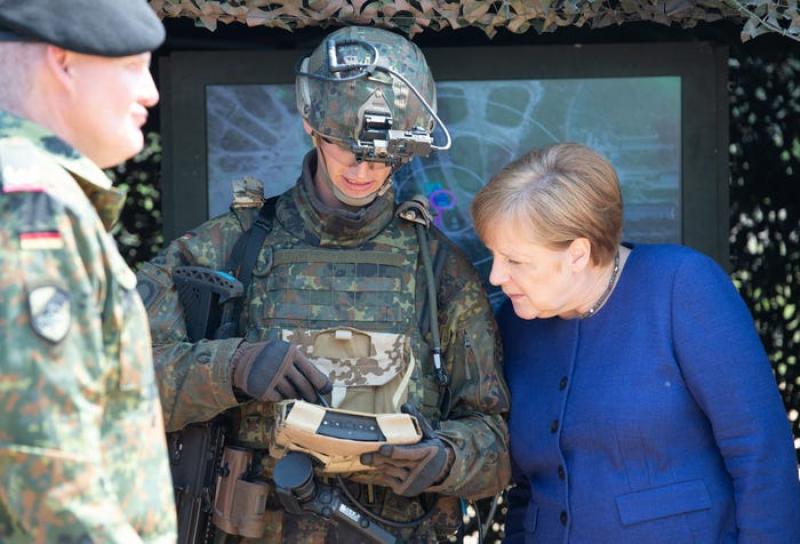Germany Moves to Strengthen Military After Russian Attack on Ukraine
By: Constantine Atlamazoglou (Business Insider)


Wake up call it seems.

A German Air Force Eurofighter at an airfield, Konztanza, Romania, March 2, 2022. Christophe Gateau/picture alliance via Getty Images Get the Insider App A personalized feed, summary mode, and ad-free experience. Download the app Close iconTwo crossed lines that form an 'X'. It indicates a way to close an interaction, or dismiss a notification.
- Germany's military has for years been plagued by manpower shortages, hardware problems, and extremism in its ranks.
- But Russia's invasion of Ukraine has forced Germany to correct the Bundeswehr's significant shortcomings.
Get a daily selection of our top stories based on your reading preferences. LoadingSomething is loading. Email address By clicking 'Sign up', you agree to receive marketing emails from Insider as well as other partner offers and accept our Terms of Service and Privacy Policy.
Russia's invasion of Ukraine has forced Europe's largest economy to take extraordinary measures to correct its significant and longstanding military shortcomings.
On the day of the invasion, Lt. Gen. Alfons Mais, the chief of staff of the German army, publicly lamented the state of the German military, writing in a LinkedIn post that "the army which I have the honour to command, is standing there more or less empty-handed."
Addressing persistent criticism of Germany's contributions to NATO, Mais said "the options we can offer the [German] government in support of the alliance are extremely limited."
Mais said the asymmetric character of the war in Afghanistan had shaped the German military operationally and structurally and called for a shift in posture, warning that otherwise the German military would not be able to fulfill its "constitutional duty" and meet its "obligations in the alliance."
A steady decline
German Chancellor Angela Merkel looks a digital map during a demonstration by NATO's Very High Readiness Joint Task Force, in Muenster, Germany, May 20, 2019. Christophe Gateau/picture alliance via Getty Images
During the Cold War, West Germany consistently spent about 3% of its GDP on defense and its military was very well regarded within NATO, but defense spending fell rapidly after the Cold War and German reunification, reaching nearly 1% of GDP in 2005.
The dissolution of the Warsaw Pact, NATO's eastward expansion, and American unipolarity created a sense of security in the German political and military establishment.
Tellingly, Mais said that in his 41st year of "peace-time service" he would not have thought that he "would have to experience a war."
In 2011, Chancellor Angela Merkel responded to the European debt crisis with reforms to the country's military in an effort to keep inflation low and ensure GDP surpluses. These included the reduction of troops and bases and the suspension of conscription. Spending was also kept at very low levels.
German soldiers during the Baden-Wurttemberg Counter-Terrorism Exercise, October 19, 2019. Sebastian Gollnow/picture alliance via Getty Images
Europe's security environment deteriorated after Russia's annexation of Crimea in 2014, Germany's military spending gradually increased, rising during the tenures of President Barack Obama and President Donald Trump, who both stressed the importance of NATO burden-sharing.
Nevertheless, Germany's defense spending had only reached 1.4% of GDP by 2020.
The years of underinvestment significantly reduced the German military's capability and readiness levels, creating many operational problems.
In 2014, Germany's defense minister acknowledged that most of Germany's air force was unfit for service and that Germany would be behind in its contribution to NATO in case of a security emergency.
In 2018, German jets were unable to join NATO exercises because of technological deficiencies resulting from a lack of necessary updates, prompting the air force's chief of staff to say the force was "at a low point." In the same year, none of Germany's six submarines were ready for combat.
German Class 212A submarine U36 at its christening ceremony at a shipyard in Kiel, Germany, May 15, 2013. Christian Charisius/picture alliance via Getty Images
In 2019, the problem became so dire that the military's readiness report was kept classified for the first time due to security concerns.
In 2020 the German military had only 184,000 troops — down from nearly a half-million in 1990 — and it has dealt with recruiting challenges and rising far-right extremism in the ranks.
Despite these problems, Germany has been a significant contributor of manpower to NATO and is currently leading one of the alliance's battlegroups in Eastern Europe.
Mais said the German military's poor condition was anticipated, hinting that military leaders could not convince political leaders to change course.
The war in Ukraine appears to have prompted action that years of warnings didn't.
A new page
German Bundeswehr soldiers in a Wiesel 1 MK light armored weapons carrier during exercise in Munster, Germany, October 13, 2017. Florian Gaertner/Photothek via Getty Images
During an extraordinary session of the German parliament on February 27, Chancellor Olaf Scholz announced that Germany will create a one-off special fund of 100 billion euros to support its military in 2022.
This is more than double its 2021 budget of 47 billion euros and will put Germany over NATO's 2%-of-GDP spending target. (Alliance members agreed in 2014 to reach that spending level by 2024).
"From now on, year-on-year more than 2% of our GDP will be invested in defense," Scholtz said, drawing applause from lawmakers.
Highlighting a change in perception, Scholz said the increases were not to satisfy NATO obligations but for Germany's "own security." Russia's February 24 invasion "marks a change in the history of our continent," Scholz added, calling it "Putin's war."
"The issue at the heart of this is whether power is allowed to prevail over the law," Scholz said, "or whether we have it in us to keep warmongers like Putin in check. That requires strength of our own."
Constantine Atlamazoglou works on transatlantic and European security. He holds a master's degree in security studies and European affairs from the Fletcher School of Law and Diplomacy.








Good move considering what is going on.
Trump and his supporters are off topic. Those who respond to themselves to avoid keyboard cooties by actually replying to the person they are quoting/mocking/refuting will have their comments removed.
And about damn time too. This was from an article last month that I saw... I don't have the article anymore but this was a quote from it that I had posted last month.
The Inspector of the German Army Lt. Gen. Alfons Mais has stated that the German army would be limited in it's ability to assist in a NATO mission. As he put it, the German Army is standing bare.
I read the same article.
Yes, the neo-liberal world order is imploding more quickly than anyone predicted. Nationalism is on the march. Volodymyr Zelensky has become the face of ultra-nationalism. Suddenly national sovereignty has become an issue of existential importance.
Did anyone notice the influence of the MAGA movement on Biden's SOTU address?
I will believe Democrats believe in the US national sovereignty when they close the damn southern border; and actually start deporting illegal immigrants.
Until then it is just lip service.
Following the Biden policy, the US should at least sanction Mexico and Honduras. Too bad we can't shut off the drug cartels from banking and finance. The cops can seize ordinary people's assets on little more than a whim but we can't seize the drug cartels assets? There are Mexican oligarchs, too.